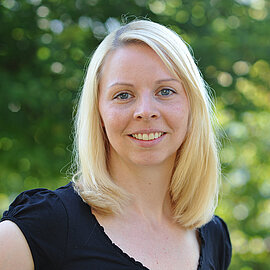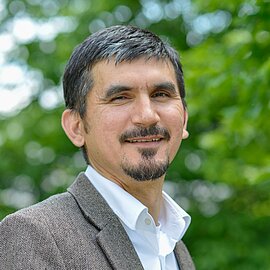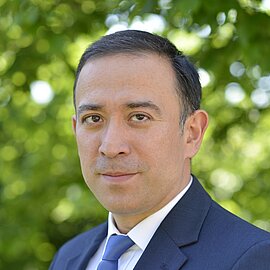Das IAMO organisierte vom 24. bis 26. November 2014 in Halle (Saale) eine internationale Konferenz mit dem Titel "Regional Economic Cooperation in Central Asia (ReCCA): Agricultural Production and Trade". Über 90 Teilnehmerinnen und Teilnehmer aus den vorwiegend zentralasiatischen Ländern, aber auch aus Armenien, Deutschland sowie der Schweiz, diskutierten auf drei Plenarsitzungen und zehn parallelen Sitzungen über die Herausforderungen regionaler Zusammenarbeit und einer nachhaltigen Entwicklung für die Wirtschaft in den Transformationsländern Zentralasiens. Die Veranstaltung bot den internationalen Gästen aus verschiedenen Forschungsinstituten und -organisationen, Universitäten und Ministerien eine Plattform, um sich über die bestehenden Probleme der Region, aber auch mögliche Alternativen und Chancen hinsichtlich einer besseren regionalen wirtschaftlichen Zusammenarbeit auszutauschen.
Die Konferenz wurde in Zusammenarbeit mit dem Institut vom Regional Environmental Centre for Central Asia in Kasachstan, der Agraruniversität Samarkand in Usbekistan und der Kirgisischen Nationalen Agraruniversität organisiert. Finanzielle Unterstützung erhielten die Organisatoren vom Deutschen Akademischen Austauschdienst (DAAD) sowie von der Fiat Panis Stiftung und der Stadt Halle (Saale).
Konferenzprogramm: Download (englisch)
PRÄSENTATIONEN
DAY 1
Plenary Session 1: Taking stock of agricultural development in Central Asia
- Agricultural development traps in Central Asia, Martin Petrick (IAMO, Germany)
- Two decades of research on land and water reforms, trade and regional integration in post-Soviet Central Asia, Nodir Djanibekov (IAMO, Germany)
Session A: Agricultural development issues
- Conservation agriculture as a sustainable option for addressing land and water problems in Central Asia, Aziz Nurbekov (ICARDA-CAC, Uzbekistan)
- Current state of land reform in Tajikistan (in Russian), Hukmatullo Ahmadov (Soil Science Institute of Academy of Sciences, Tajikistan)
- Agricultural incentives in the Kyrgyz Republic under the influence of changing macroeconomic conditions, Eliza Zhunusova, Institute for Agricultural Policy and Market Research (Justus-Liebig University Giessen, Germany), Beitrag
DAY 2
Plenary Sessions 2: Issues of water resources and trade in Central Asia
- Are export controls an effective tool to dampen domestic prices? Evidence from wheat export restrictions in Kazakhstan, Russia and Ukraine, Linde Götz (IAMO, Germany)
- Transformations in water management in Central Asia: From water challenges to development challenges, Iskandar Abdullaev (CAREC, Kazakhstan), Beitrag
Parallel Session B1: Water management
- Financial mechanism for sustainable water management in irrigated agriculture of Uzbekistan (in Russian), Sherzod Muminov (Scientific Information Center of Interstate Commission for Water Coordination in Central Asia, Uzbekistan), Beitrag
- Options for improving water service fee collection in agriculture of Turkmenistan (in Russian), Stanislav Aganov (National project expert, UNDP, Turkmenistan)
- Cotton production and water management in Turkmenistan, Kurban Ovezmuradov, Water Research and Development Institute of Ministry of Water Economy, Turkmenistan)
- Formation of market relation in water – economy complex of Tajikistan and Central Asia (in Russian), Inom Normatov (Institute of Water problems, Hydropower and Ecology of the Academy of Sciences, Tajikistan)
Parallel Session B2: Land use and agricultural organizations
- Economics of land degradation in Central Asia, Alisher Mirzabaev (Center for Development Research (ZEF), University of Bonn, Germany)
- Research on land use functions in Central Asia: A bibliometric analysis, Ahmad Hamidov (Leibniz Centre for Agricultural Landscape Research (ZALF), Germany), Beitrag
- Effects of uncertainty under farm land consolidation process: A perspective of risk-averse cotton growing farmers in Uzbekistan, Utkur Djanibekov (Institute for Food and Resource Economics, University of Bonn, Germany)
Parallel Session C1: Land use and pastures
- Reevaluation of policies, social structures and institutional governance in transition, Nozila Mukhamedova (IWMI, Uzbekistan)
- Sustainable livestock management under changing climate in Central Asia, Nariman Nishanov (ICARDA-CAC, Uzbekistan)
- Agricultural potentials and ecosystem trade-offs in Kazakhstan, Alexander Prishchepov (IAMO, Germany)
- Pasture-related legislation and socio-ecological challenges in Kyrgyzstan, Andrei Dörre (Centre for Development Studies, Freie Universität Berlin, Germany), Beitrag
Parallel Session C2: Water use in agriculture
- Examining institutional path dependency in shared water management in the Ferghana Valley, the Syr Darya basin, Ilkhom Soliev (Technical University of Berlin, Germany)
- Some highlights on potentials and limitations of community based water governance in mountain irrigation system in Tajikistan, Alisher Shabdolov (University of Bern, Switzerland)
- Promoting regional water cooperation in Central Asia through international law, Dinara Ziganshina (Scientific Information Centre of Interstate Commission for Water Coordination in Central Asia, Uzbekistan)
- Options of regional crop specialization for sustainable water use in the Aral Sea Basin, Maksud Bekchanov (International Water Management Institute, Sri Lanka)
Session D: Development of regional organizations and market integration
- Uzbekistan: Foreign trade liberalization and basic mechanisms on reduce trade barriers, Nigora Talipova (Coordination-methodical center on the issues of contemporary history under the Ministry of Higher and secondary special education, Uzbekistan), Beitrag
- Analysis of the effects of Kazakhstan’s customs union accession using GTAP model and GTAP database, Lyazzat Nugumanova (Justus-Liebig University Giessen, Germany)
- Key prospects of economic integration in Central Asia, Nazira Momosheva (Kyrgyz National University, Kyrgyzstan)
Session E: Development of regional organizations and market integration
- Welfare effects of partial and full liberalization of international trade in Uzbekistan, Doniyor Sattarov (Justus-Liebig University Giessen, Germany), Beitrag
- Kazakhstan during the economic reforms (in Russian), Galiya Akimbekova (Kazakh Research Institute of Agribusiness Economics and Rural Development, Kazakhstan), Beitrag
- Agriculture of Tajikistan in the system of regional trade-economic relations (in Russian), Khodjamakhmad Umarov (Institute of Economy and Demography, Tajikistan)
DAY 3
Plenary Session 3: Regional economic cooperation and role of supply chains
- Structural changes in supply chains and their implications to small producers in Central Asia, Ihtiyor Bobojonov (IAMO, Germany)
- Overview of results from the MATRACC project – Wheat supply chains in Central Asia and the Caucasus, Ramona Teuber (IAMO, Germany)
Parallel Session F1: Supply chains
- An establishment of agroclusters as a key for the development of agro-processing industry in Uzbekistan, Shavkat Hasanov (Samarkand Agricultural University, Uzbekistan), Beitrag
- Analysis to food situation in the Kyrgyz Republic (in Russian), Myrzabek Batyrkanov (Kyrgyz National Agrarian University after K.I. Skryabina, Kyrgyzstan), Beitrag
- Food losses and wastes in the Armenian agri-food chains, Vardan Urutyan, Anna Yeritsyan (International Center for Agribusiness Research and Education (ICARE), Armenia)
- Development of integrational processes in agrofood markets of Kazakhstan (in Russian), Gulnar Bekenova (Kazakh National Agrarian University, Kazakhstan), Beitrag
Parallel Session F2: Supply chains
- Ensuring the competitive strength of Uzbekistan’s fruit and vegetable production sector by boosting the efficiency of marketing activity is a key factor for guaranteeing food safety, Shukhrat Otajonov (Coordinating Committee for Science and Technology Development under the Cabinet of Ministers, Uzbekistan)
- Change of crop pattern of rural smallholder producers: In the search of comparative advantage of bean farmers of Kyrgyzstan, Kanat Tilekeyev (University of Central Asia, Kyrgyzstan)
- Why fruit and vegetable production is not fruitful for Uzbek farmers?, Alisher Ergashev (Center for Development Research (ZEF), University of Bonn, Germany), Beitrag
- The effects of consumer income growth on the agricultural sector of Tajikistan, Parviz Khakimov (Free Lance Expert, Tajikistan)
Session G: Agricultural services and food security
- Current state and future prospects of crop insurance in Uzbekistan, Nuriddin Muradullayev (Banking and Finance Academy, Uzbekistan), Beitrag
- Development of institutional and policy environment for agriculture and food security in Tajikistan, Tanzila Ergasheva (Institute of Agricultural Economics of the Academy of Sciences, Tajikistan), Beitrag
- Consulting services in Uzbekistan agriculture, Gayrat Ibragimov (Samarkand Agricultural University, Uzbekistan), Beitrag
- Information and consultation services in agriculture as a mechanism for the transfer of innovation, Iroda Rustamova (Tashkent State Agrarian University, Uzbekistan)
ReCCA-Konferenz
Regional Economic Cooperation in Central Asia: Agricultural Production and Trade
24. – 26. November 2014
Theodor-Lieser-Straße 2, 06120 Halle (Saale), Germany
recca(at)iamo.de


